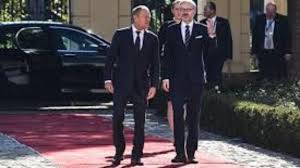Polish, Czech leaders urge tougher EU migration rules

Prague: Poland and the Czech Republic on Wednesday called for hardening the European Union’s migration policy and boosting the bloc’s external border against what they argued was externally orchestrated migratory pressure.
Both Central European countries have in the past months campaigned for “new ways” to handle irregular migrants and toughening the landmark overhaul of EU migration policies coming into effect from 2026.
Calling the pact “insufficient” after talks with his Polish counterpart, Czech Prime Minister Petr Fiala said Prague and Warsaw “want a stricter and faster asylum policy.”
“We want to boost the repatriation policy, which is inefficient. We want to step up the combat with smugglers and illegal migration organizers,” Fiala said.
Poland’s premier Donald Tusk urged “very serious debate” on migration during the next summit of the bloc leaders in Brussels.
“Together we have to convince the other partners in the EU, and we will do so, that the task of the EU is to protect the external border and to reduce illegal migration to a minimum,” Tusk told reporters in Prague.
He added that the bloc had to be protected “from the wave of illegal migration, increasingly organized by external forces.”
Poland is one of the countries on the EU’s eastern flank that has been dealing with a migration influx it has described as a “hybrid” attack by Belarus and its ally Russia.
Since summer 2021, thousands of migrants and refugees, mainly from the Middle East, have crossed or attempted to cross the border between Belarus and Poland.
“Every day, thousands of Polish soldiers, policemen, border guards are not guarding but fighting against the pressure organized by the Lukashenko regime,” Tusk said.
“This resembles a war landscape rather than a normal border policy. Shots are heard every day,” he added.
Warsaw has accused Moscow of smuggling people from Africa into Europe by sending them to the Polish border through Belarus.
In May, Warsaw announced it would spend more than 2.3 billion euros ($2.5 billion) to boost border protection.





